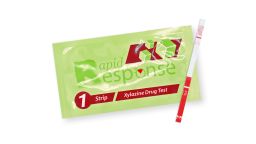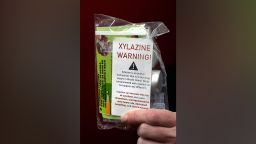US lawmakers are moving to classify xylazine, the animal tranquilizer that’s increasingly infiltrating illicit drugs, as a controlled substance.
Bipartisan legislation introduced Tuesday in the House and Senate reflects growing concern over the highly dangerous sedative, commonly known as “tranq” or “tranq dope.”
“Drug traffickers are going to great lengths to pad their profits with dangerous drugs like tranq, and we need to empower law enforcement to crack down on its spread in our communities,” Sen. Catherine Cortez Masto, D-Nev., lead sponsor of the bill, said in a statement. “This bipartisan legislation will ensure the DEA and local law enforcement have the tools they need to get xylazine off our streets while protecting its important use as a veterinary tranquilizer.”
Xylazine has not been approved for human use. It has heavy sedative effects like an opioid but isn’t one, so it doesn’t respond to the opioid overdose antidote, naloxone, also known as Narcan.
Fentanyl is a fast-acting opioid, and people who use it illicitly say that adding xylazine can extend the duration of the high. However, xylazine is associated with severe soft-tissue wounds and necrosis – sometimes described as rotting skin – that can lead to amputation.
The US Drug Enforcement Administration issued a public health alert this month noting that xylazine is widespread and has been detected in about 23% of fentanyl powder and 7% of fentanyl pill seizures.
DEA Administrator Anne Milgram said in the alert that “xylazine is making the deadliest drug threat our country has ever faced, fentanyl, even deadlier.”
Despite reports about the alarming rise of xylazine, also called a “zombie drug,” federal law enforcement has not had the tools to regulate it.
The proposed legislation would address this gap by making xylazine a Schedule III drug under the Controlled Substances Act, a category on the five-level system for substances with moderate to low potential for physical or psychological dependence. Xylazine would be one level below opioids like fentanyl.
The bill would also require manufacturers to send reports on production and distribution to the DEA so the agency can ensure that it is not being diverted to the black market.
“Our bipartisan bill would take important steps to combat the abuse of xylazine by giving law enforcement more authority to crack down on the illicit distribution of this drug, including by putting stiffer penalties on criminals who are spreading this drug to our communities,” Sen. Maggie Hassan, D-N.H, a cosponsor of the bill, said in the statement. “My colleagues on both sides of the aisle are seeing the impact of this deadly drug in their states, and we will continue working together to move this critical bill forward.”
Xylazine is essential in veterinary medicine to sedate large animals like horses and cattle.
Dr. Lori Teller, president of the American Veterinary Medical Association, said the group “fully supports this congressional effort to combat illicit xylazine.”
“We urge Congress to pass the Combating Illicit Xylazine Act quickly as it strikes the right balance of protecting our communities while preserving veterinary access to this critically important animal drug,” Teller said.
However, Mary Sylla, director of overdose prevention policy and strategy at the National Harm Reduction Coalition, a national advocacy organization for people who use drugs, says the bill is a move in the wrong direction.
“The position of the National Harm Reduction Coalition is that criminalization of drugs has never worked to reduce drug use or addiction. It’s the opposite. Criminalization is the opposite of harm reduction,” she said.
Sylla would rather to see more funding and support for evidence-based harm reduction, such as overdose prevention and syringe access programs.
Harm reduction “has evidence that it reduces drug use, it gets people engaged in treatment. It meets people where they are and allows them to make healthier choices about their substance use.”
The bill, which has been endorsed by the National Association of Police Organization and other law enforcement groups, is likely to disproportionately affect people on the lowest levels of the drug distribution chain and users themselves, says Maritza Perez, director of the Drug Policy Alliance’s Office of Federal Affairs.
“Drug users are not seeking xylazine. It’s often mixed into drugs that they’re taking. So we have concerns that we’d be punishing drug users for a substance that they may not even know is found in their drug,” she said. “We would encourage lawmakers to instead fund and protect health services for people who use drugs, because that’s really how we stop the harms of drug use. It’s not by arresting people and throwing them behind bars.”
Get CNN Health's weekly newsletter
- Sign up here to get The Results Are In with Dr. Sanjay Gupta every Tuesday from the CNN Health team.
Some states have taken matters into their own hands. Lawmakers in some states have taken steps to make xylazine a controlled substance, and Ohio Gov. Mike DeWine signed an executive order Wednesday to classify it as a Schedule III controlled substance.
Lawmakers hope the bill will provide new tools to combat this deadly trend on a national level.
“Drug overdoses remain unacceptably high as cartels and traffickers continue to flood our nation with deadly and ever-changing poison,” Sen. Chuck Grassley, R-Iowa, another of the bill’s sponsors, said in the statement. “We cannot successfully prevent these tragedies with one hand tied behind our back.”
Correction: This story has been updated to reflect how states are approaching the regulation of xylazine.



